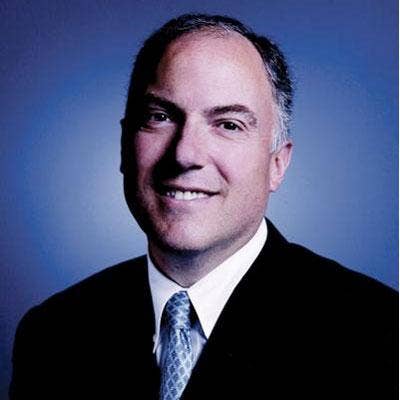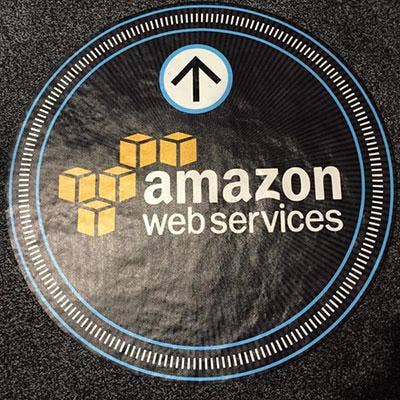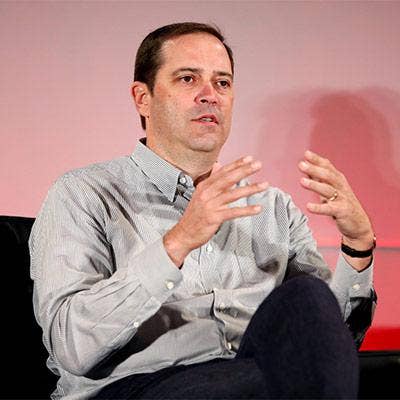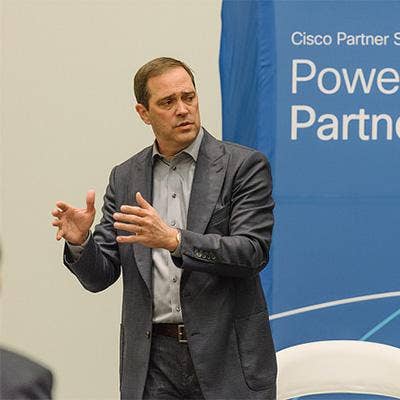Q&A: Presidio CEO Sounds Off On AWS, Chuck Robbins And Cisco's New Software Era

Ready To Pounce
Presidio CEO Bob Cagnazzi said his $3 billion New York-based company, No. 21 on the CRN 2015 Solution Provider 500 and a top Cisco partner, is ready to pounce on the new revenue opportunities unlocked by Cisco's transition to a network software subscription model that will leave competitors in the dust.
"The ability for the client to consume the technology in this new way enables all of us to have greater opportunities to expand the services around the network," said Cagnazzi in an interview with CRN. "Cisco is making the right move, saying, 'You may be successful commoditizing the hardware, but you'll never be successful competing with Cisco on the operating system.' "
Cagnazzi also talked to CRN about the impact CEO Chuck Robbins is making at Cisco and why partners shouldn't view Cisco and Amazon Web Services as "the Hatfields and McCoys." Take a look at what he had to say in the following slides.

Is it a good move by Cisco to transition to this software subscription model around its core network?
It's a smart play. No one has got a bigger install base on the core routing and switching than Cisco does. Through the years, folks like a Juniper [Networks] have tried to take share away from Cisco. They've been unable to do so because they didn't have the features and functionality that Cisco has over the long term.
Cisco is making the right move, saying, "You may be successful commoditizing the hardware, but you'll never be successful competing with Cisco on the operating system."

Will this strategy expand the opportunities for channel partners?
The strategy is a really, really sound one. The ability for the client to consume the technology in this new way enables all of us to have greater opportunities to expand the services around the network … that clients can turn on once they have these software subscriptions.
In the traditional world, it's a little bit harder for them to do that -- it's not as top of mind. But by reorienting how the customers consume this technology, you start getting them thinking about the different services you're offering, and the ability to turn them on and start using them helps the consumption model. It changes how customers consume this technology and gets them thinking about the different software services we can offer. Then we can work with them to start planning how they're going to implement analytics or programmability around ACI [Application Centric Infrastructure] or software-defined networking.

Do you think this makes Cisco more successful against Amazon Web Services?
I do think that as an industry, we really looked at this the wrong way. This is not the Hatfields and McCoys. You need both elements of that to create a hybrid cloud solution or IT as-a-services model. [There are] going to be workloads in the public cloud and in the private clouds. It's a 1-plus-1 equals 3 environment.

How do these two environments complement each other?
When we can get with a client and create this hybrid cloud environment for them, that drives a lot of Cisco product, a lot of Cisco revenue and a lot of revenue from a professional and managed services side. Yeah, it's going to drive some AWS revenue too, but that's part of the solution.
If we are not talking about the entire solution and we're only talking about either private cloud alone or public cloud alone, I don't think you deserve credibility in the marketplace. Because you're not acknowledging that there are different types of workloads, and not acknowledging the needs for clients to make those workloads portable between different types of clouds.

Can companies just migrate everything to the public cloud?
You've got a lot of really hot companies that say, "We're just migrating everything to the public cloud." If that's the way you look at the world -- if I'm a hammer and everything is a nail -- then that's not right, because there are workloads not suited for public cloud. By contrast, if I'm saying, "Private cloud, forget about public cloud" -- then I'm the hammer looking for the nail.
What the clients are looking for is for somebody to help them create the entire solution, and I think that increases the size of the pie and that drives opportunity for Cisco and us on the private cloud.

What is Presidio doing to get ready for Cisco's software transition?
We've made a lot of investment through the years. We have a whole software development group around [the Internet of Things]. Skills around software development, data analytics and an SDN group.
We bought Sequoia Worldwide and we worked with them for the previous six months developing our own IT on a software subscription base just for things like orchestration and automation. So we've got the expertise and the technology to take these new models to the market with Cisco, because we got the technical expertise to help clients absorb and adopt the new features you're going to be able to layer on with this new software model.
So Presidio is ready to rock and roll with this software model right now?
We're a top-five Cisco software partner. We've been running the model for a number of years in terms of selling Cisco software and subscription services and helping the clients adopting them to our Presidio Managed Cloud, built on the Cisco One platform -- that accelerates Cisco One sales. Clients are looking toward ease of use and ease of provision for IP services, that's why AWS is growing so much.
What we've done around Presidio Managed Cloud with Cisco and with the expertise with Sequoia group is create an orchestration and automation tool that's as-a-Service to our clients, that drives Cisco revenues, our revenues, but provides that easy point-and-click provisioning and mobility of workloads between public-public, private-private, public-private, etc.

How big of a change will this be for Cisco and its channel?
It continues to extend Cisco's lead in this space. It protects the base. … It changes the nature of their business to a degree and it changes the nature of our business to a lesser degree, because we're still selling Cisco product and providing the managed services around it.

What's your view on Chuck Robbins after nearly one year as Cisco CEO? Is he making the right investments?
The investments that he has made have started to make Cisco a lot more relevant in a lot more areas where they weren't before. Cisco has done a good job of jumping into new markets before, but truth be told, things were getting a little bit stale near the end of [former CEO and still Chairman John Chambers'] tenure. Chuck has come in and with the appointment of [Zorawar] Biri Singh [as chief technology officer] and some of the reorganization has really put a focus on areas where Cisco can create a competitive advantage in how they're going to market and the technology that they bring to market.
There's been more evolution of what we can sell and what clients can take advantage of in the last 12 months since Chuck has been there than we've seen in a long time.

Do you think Chuck has made a noticeable impact inside Cisco yet?
I've known Chuck from when he pretty much started with Cisco. I've always found him extremely bright, responsive, fair and practical in what he does. The impact that he's making on Cisco a year later, there is definitely a lot more energy in the Cisco organization than there had been. Energy helps us sell and gets us aggressive in the market.